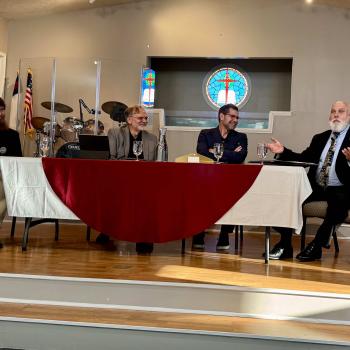
The Abrahamic covenant paints a clear picture of the ultimate intentions of God in his relationship with humankind. Genesis 12:1-3,
The Lord had said to Abram, “Go from your country, your people and your father’s household to the land I will show you.
“I will make you into a great nation,
and I will bless you;
I will make your name great,
and you will be a blessing.
I will bless those who bless you,
and whoever curses you I will curse;
and all peoples on earth
will be blessed through you.”
The key to understanding this everlasting covenant is the final part of the promise: ‘all peoples on Earth will be blessed through you’. This was not a promise that stops at the direct descendants of Abraham but instead touches all nations of the Earth. This is why, in Genesis 17:5, God promises to make Abraham the ‘father of many nations’.
In Galatians 3: 6-9, we are Paul teaches that the Abrahamic Covenant is an expression of God’s intention to include:
‘So also Abraham “believed God, and it was credited to him as righteousness.” Understand, then, that those who have faith are children of Abraham. Scripture foresaw that God would justify the Gentiles by faith, and announced the gospel in advance to Abraham: “All nations will be blessed through you.” So those who rely on faith are blessed along with Abraham, the man of faith.
All people who have faith are children of Abraham, and therefore inheritors of God’s promises to him. There is no special blessing set aside for a single nation, when
the promises of God to Abraham are, through Christ, inherited by every nation and every person on Earth.
What about ‘non-Christians’?
I was brought up to see people as either Christians or ‘non- Christians’. There were those who were in and those who were out. The way I see things today, this is a reinvention of the Jew/Gentile fallacy believed by Jewish members of the early church. In the church at Galatia, Jewish members of the congregation were pressurising Gentile (non-Jewish) congregants to be circumcised, which was an aspect of Hebrew Law under the Old Covenant. They very much wanted to cling to the idea that the Jewish people had a special status with God and were fiercely rebuked by Paul for failing to grasp the Gospel message of inclusion. Galatians 5: 1-6:It is for freedom that Christ has set us free. Stand firm, then, and do not let yourselves be burdened again by a yoke of slavery.
Mark my words! I, Paul, tell you that if you let yourselves be circumcised, Christ will be of no value to you at all…For in Christ Jesus neither circumcision nor uncircumcision has any value. The only thing that counts is faith expressing itself through love.
Paul addressed the tendency to assign special status in undeniably clear terms. Galatians 3:28-29,
There is neither Jew nor Gentile, neither slave nor free, nor is there male and female, for you are all one in Christ Jesus. If you belong to Christ, then you are Abraham’s seed, and heirs according to the promise.
It is lamentable then that we have replicated the whole Jew/Gentile division as Christian/‘non-Christian’. We’ve missed the entire point of both the Abrahamic Covenant and the Gospel – that all are included in the promises of God. Instead of grasping the heart of God’s inclusive promises, we prefer to erect barriers and hunker down as ‘us’ rather than ‘them’.
What about salvation?
Some readers will be scratching their heads, wondering how God can be inclusive when only some will be saved. I began this article by describing the Bible as an overarching story of ever-increasing inclusion, and that story ends with all being saved (sṓzō, meaning to rescue, deliver, heal, or preserve). Believers are often stunned by the idea that all people will be saved, but the New Testament is brimming with promises of universal salvation:2 Peter 3:9,
The Lord is not slack concerning His promise, as some count slackness, but is longsuffering toward us, not willing that any should perish but that all should come to repentance.
1 Corinthians 15:21-22,
For since death came through a man, the resurrection of the dead comes also through a man. For as in Adam all die, so in Christ all will be made alive.
1 Timothy 2:3–6,
This is good, and pleases God our Savior, who wants all men to be saved and to come to a knowledge of the truth. For there is one God and one mediator between God and men, the man Christ Jesus, who gave himself as a ransom for all men.
Romans 5:18-19,
Consequently, just as one trespass resulted in condemnation for all people, so also one righteous act resulted in justification and life for all people.
1 John 2:2,
He is the atoning sacrifice for our sins, and not only for ours but also for the sins of the whole world.
Romans 11:32
For God has bound all men over to disobedience so that he may have mercy on them all.
Philippians 2:10-11,
So that at the name of Jesus every knee should bow, in heaven and on earth and under the earth, and every tongue confess that Jesus Christ is Lord, to the glory of God the Father.
Revelation 5:13
And I heard every creature in heaven and on earth and under the earth and in the sea, and all that is in them, saying, “To him who sits on the throne and to the Lamb be blessing and honour and glory and might forever and ever!”
John 12:32
“And I, when I am lifted up from the earth, will draw all people to myself.”
Colossians 1:20
And through him to reconcile to himself all things, whether on earth or in heaven, making peace by the blood of his cross.
Let’s be frank – it’s everywhere!
God’s ultimate intention
People who’ve spent a good number of years in the Evangelical church, and especially those who grew up in that tradition, as I did, can struggle to understand the scriptures in fresh or deeper ways. We’ve been given an inflexible framework to work within and have been taught exactly how we should understand these verses until our brains are coded with a single program.
If only we could switch off the confirmation bias, we might pause long enough to see what is hiding in plain sight. The ultimate intention of God is the salvation of all, as evidenced by the many promises quoted in this article.
In Ephesians 1:8-10, Paul writes of that inclusive ultimate intention:
With all wisdom and understanding, he made known to us the mystery of his will according to his good pleasure, which he purposed in Christ, to be put into effect when the times reach their fulfillment – to bring unity to all things in heaven and on earth under Christ.
This is the mystery of God’s will; his dream and ultimate intent – to bring all things into unity in Christ.
Note from the author: For those wishing to dig deeper into how universal salvation might be achieved, this article is a good place to start.
7/8/2025 11:07:35 PM





